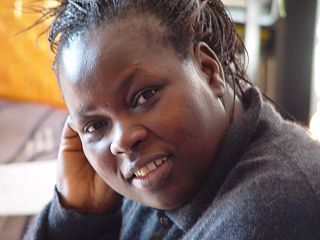Related Research Articles

Lumumba is a 2000 biographical film directed by Raoul Peck. A co-production of France, Germany, Belgium, and Haiti filmed in French, the film depicts the rise and fall of Patrice Lumumba, and is set in the months before and after Congo-Léopoldville achieved independence from Belgium in June 1960. Political unrest in the Democratic Republic of the Congo at the time of filming caused the film to be shot in Zimbabwe and Beira, Mozambique. The film received positive reviews from critics, and won awards from the American Black Film Festival, the Political Film Society, and the Panafrican Film and Television Festival of Ouagadougou.

Salif Keïta Traoré, known as Keita, is a Malian retired footballer who played as a striker.
Fatou N'Diaye is a French actress, originally from Senegal, born 1980 in Saint-Louis du Sénégal.

Fatou Bom Bensouda is a Gambian lawyer and international criminal law prosecutor.
Mahama Johnson Traoré (1942–2010) was a Senegalese film director, writer, and co-founder of the Ouagadougou-based Pan-African Cinema Festival (FESPACO).

Fatoumata Diawara is a Malian actress, singer-songwriter and guitarist currently living in France. She received two nominations at the 61st Annual Grammy Awards for Best World Music Album for her album Fenfo and Best Dance Recording for Ultimatum in which she was featured with the English band Disclosure.
Makoukou Célestine Ouezzin Coulibaly-Traoré, née Macoucou Traoré, was an anti-colonial leader in French West Africa. She helped to set up the women's section of the Rassemblement Démocratique Africain in Côte d'Ivoire and Upper Volta, becoming its secretary general in 1948. In 1958, she was appointed Upper Volta's Minister of Social Affairs, probably making her the first woman to join a cabinet in any of the French-speaking West African governments.
Africa Paradis is a 2006 satirical speculative fiction film written and directed by Beninese actor Sylvestre Amoussou. It was produced in France and Benin and was intended to comment on the situation of African refugees in Europe.

Irène Tassembédo is a dancer, choreographer and actress from Burkina Faso.

Fatou Sow is a Senegalese feminist sociologist specialising in sociology of gender.

Pamela Badjogo is an Afro-Jazz musician from Gabon and a former member of Les Amazones d'Afrique.
Jeanne Goba, known by her pen name Jeanne de Cavally, was an Ivorian children's book writer.
Lingeer Ngoné Dièye was a Lingeer from Toubé Dieye in Northern Senegal. Toubé Dieye which was in Gandiol was part of the kingdom of Cayor. She is an ancestor of the Guedj (Wolof: Géej; maternal dynasty of Cayor and Baol. She was the wife of the 17th century Senegambian noble and Teigne Thié Yasin Demba Noudj Fall, and mother of the Damel—Teigne Latyr Ngóne Dieye Fall who ruled as King of Cayor and Baol from 1697 to 1719 and became the first Guedj to rule in those kingdoms—after overthrowing the reigning maternal dynasty and installing his mother's matriclan. In usurping the throne, he committed fratricide by killing his paternal half-brother and took his throne. Ngoné Dièye was a Wolof noble woman from Gandiol, a Wolof region in the north of Senegal. In the Wolof Kingdom of Cayor, she became Queen when she married the King of Cayor, and later Queen Mother of Cayor and Baol when her son usurped the throne and unified Cayor and Baol. According to Cheikh Anta Diop, "The Guedj come from common people. They are distinguished by their adaptive ability and their military genius. The dynasty is named for the country of origin of the first founding Damel's mother. She was a commoner from the seacoast, who married the King; guedj meaning "sea" in Wolof. Her son, though he had no right to the throne, succeeded in being crowned, through his energy and mental agility."
Samantha Biffot is a Gabonese-French screenwriter, film producer and film director.
Cheik Doukouré, is a Guinean filmmaker. He is notable as the director of critically acclaimed film Le Ballon d'Or. Apart from filmmaking, he is also an actor, screenwriter and film producer.
Aïcha Thiam is a Belgian-Senegalese film director.
Tall Fatou Souko was a Malian teacher and administrative official. She was one of the earliest Malian women trade unionists and was the secretary general of the Mali Women's Union.
Kaba Nialé is an Ivorian politician who has been serving as Minister of Planning and Development and President of the Board of Governors of African Development Bank (AFDB) since 2019.
The École normal de Rufisque was a teacher training institute for women from French West Africa in Rufisque, Senegal. It existed from 1938 to 1958.
References
- 1 2 3 Diallo, Bios (12 January 2004). "Du théâtre à la réalité sociale". Jeune Afrique (in French). Retrieved 6 October 2020.
- ↑ "Mariam Kaba, une femme de caractère". Clap Noir (in French). 5 January 2007. Retrieved 6 October 2020.
- ↑ Ngoma, Hermione (11 January 2016). "Mariam Kaba : Lumumba fait partie de notre patrimoine". Agence D'Information D'Afrique Centrale. Retrieved 6 October 2020.